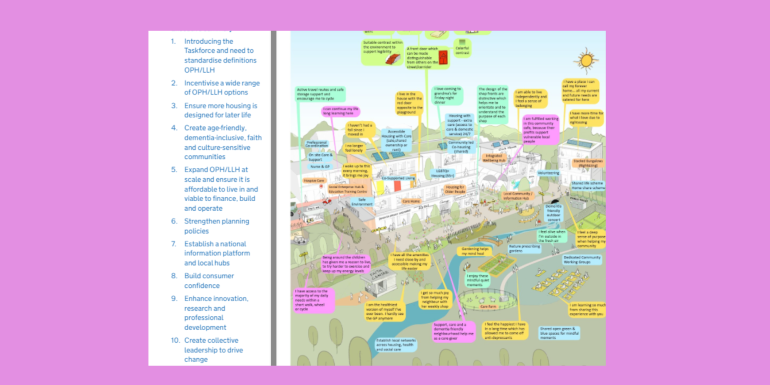Integrated Retirement Communities key to avoiding care system collapse and tackling care worker crisis, says report
- Integrated Retirement Communities cut time care staff spend travelling, improve health of residents and can reduce the need for care workers by 60,000
- Findings come amid predictions of 490,000 additional care staff being needed by 2035
- Putting the 'care' in Housing-with-Care report also finds care quality in Integrated Retirement Communities well above average
A new report published today has found that Integrated Retirement Communities, otherwise known as housing-with-care, are essential to preventing the UK’s social care system collapsing and could reduce the care staff shortage by 60,000 – but only if the sector is given the backing to grow to levels seen in New Zealand, Australia and the US.
The Putting the 'care' in Housing-with-Care report, published by ARCO (Associated Retirement Community Operators), says care can be provided more effectively and efficiently in Integrated Retirement Communities due to staff giving care to residents onsite and not needing to travel in between visits, and because many residents require less care after moving in due to health and wellbeing improvements.
Integrated Retirement Communities combine independent living for older people renting or owning their own flat, together with 24/7 onsite staffing, CQC-registered domiciliary care for those who need it, and a wide range of integrated services and facilities.
The report compares the care and support requirements of people living in Integrated Retirement Communities with those living in dispersed family homes. The report calculates that, for a typical Integrated Retirement Community with 200 people living there, 16 fewer care staff are needed than if the same levels of care were provided in the wider community – freeing up staff to provide care to those who need it elsewhere.
If the sector achieves its Vision 2030 of 250,000 over-65s living in an Integrated Retirement Community by the end of the decade, 20,000 fewer care staff will be required – rising to 60,000 if the UK matches New Zealand, Australia and the US by having 6% of over-65s living in an Integrated Retirement Community.
The findings come after charity Skills for Care recently estimated that 490,000 additional social care staff would be required by 2035, if current trends in the growth of the over-65 population continue.
As well as highlighting the important role that Integrated Retirement Communities have in tackling these workforce challenges, the new report by ARCO finds that care quality in Integrated Retirement Communities stands well above average. 97% of the domiciliary care agencies run by ARCO’s Members in Integrated Retirement Communities are rated ‘Good’ or ‘Outstanding’ by the Care Quality Commission (CQC), compared to 88% of domiciliary care agencies more widely.
The quality care provided in Integrated Retirement Communities helps residents stay independent, healthy and well for longer, and to cut NHS and social care costs. Research shows that these settings provided a safer place for older people during the pandemic than living in family home.
ARCO says its report highlights the urgent need to expand the provision of Integrated Retirement Communities in the UK. ARCO is also calling on the Government to act quickly to set up the cross-department task force on housing-with-care that it says it is considering, and to include measures to expand housing-with-care in the forthcoming social care White Paper.
Michael Voges, Executive Director of ARCO, said:
“It is clear that without significantly increasing the number of Integrated Retirement Communities, the UK care system will collapse because of a shortage of care workers. This is not just about doing good, but avoiding terribly bad outcomes.
“Our country is facing huge workforce challenges in social care, and if a sector can provide high-quality care with tens of thousands fewer staff, we should be doing everything we can to boost that sector and free up staff to so desperately needed by other parts of the social care system.
“That is why we are calling on the Government to include strong commitments to increase Integrated Retirement Communities in the social care White Paper, and to set up a cross-department task force on housing-with-care as soon as possible. We simply cannot afford not to.”
Nick Sanderson, Chair of ARCO and Chief Executive of Audley Group, said:
“We have seen during the pandemic the vital role that Integrated Retirement Communities have in keeping older people safe, healthy and well – and the provision of high-quality care is central to this.
“This report shows that we must urgently expand the Integrated Retirement Community sector not only to improve health and wellbeing, but to help the country face the workforce challenges in social care that are already here now, and will only get more prominent.
“Achieving this requires the Government to do its bit – and that means removing the policy barriers holding the sector back by setting up a cross-department task force immediately.”
Damian Green MP, Chair of the All Party Group for Longevity, said:
“Integrated Retirement Communities have a pivotal role to play in our social care system, giving older people independence and their own front door, alongside high-quality care and services.
“What this report demonstrates is that, as well as providing care to the highest standards, Integrated Retirement Communities are effective and efficient in the way they deliver this care, and free up care staff to focus on those who most their help.
“As the publication of the Government’s social care White Paper draws nearer, we’ve got to ensure there is a central place for Integrated Retirement Communities in our future social care landscape.”
Natalie Reed, Interim Head of Inspection at the Care Quality Commission, said:
“It is vitally important that throughout the social care system we strive towards the highest quality of care, so I am pleased that this report demonstrates the vast majority of care agencies run by ARCO’s members are rated ‘Good’ or ‘Outstanding’.
“High-quality care is so important for the health and wellbeing of residents, and for giving them security and peace of mind. That has never been the case more than during the pandemic.
“We look forward to continuing our work with ARCO and the Integrated Retirement Community sector to achieve the best standards of care going forward.”
Read the full Putting the 'care' in Housing-with-Care report here.
For further information please contact: Sam Dalton, Policy and External Affairs Manager, at samdalton@arcouk.org or on 07722553856
- Notes for Editors-
What are Integrated Retirement Communities?
Integrated Retirement Communities, otherwise known as housing-with-care, offer older people the opportunity to live independently in their own home as part of a wider community. Lifestyle, wellbeing and care services are available to support people’s independence and aspirations. Integrated Retirement Communities are run by a range of not-for-profit and private operators, with two-thirds of the sector being affordable or social rent.
How are these communities integrated?
Apartment homes are available for purchase, part purchase or rent, alongside a range of choices:
- Integrated Lifestyle: Facilities like restaurants, bars, gyms, cinemas, community halls and gardens offer optional activities and social opportunities
- Integrated Well-being and Care: Personal and domestic care can be delivered within people’s homes if they wish. Dedicated staff teams are on site 24/7
- Integrated with Wider Communities: Connections with wider communities through family, friends, intergenerational, volunteering or leisure opportunities are valued and cherished
Associated Retirement Communities Operator (ARCO) is the main body supporting Integrated Retirement Communities across the UK, setting standards for the sector, and representing the interests of consumers and providers at national level.





